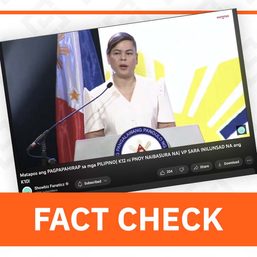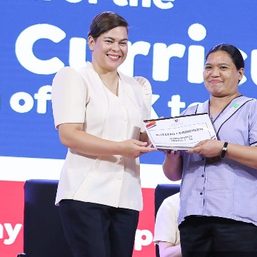SUMMARY
This is AI generated summarization, which may have errors. For context, always refer to the full article.
This compilation was migrated from our archives
Visit the archived version to read the full article.
READ: Part 1: All eyes on ALS, ‘centerpiece’ of basic ed under Duterte
MANILA, Philippines – The Alternative Learning System (ALS) has been around for years, but most learners only know about it through word of mouth – that is, through learning facilitators who go around in communities to talk about ALS.
“They didn’t hear it from the [local government units], nothing in media to say na meron palang ganitong programa (that there is such a program),” Education Assistant Secretary for ALS G.H. Ambat told Rappler in an interview.
No wonder, then, that the current enrollment is only at half a million even when the estimated ALS target population is 5.4 million.
“We have the second chance. Kaya napaka-importante, sabi namin dodoblehin namin literacy volunteers na iikot kasi sila talaga ‘yung reason kaya nakapag-enroll itong mga ‘to. They don’t just map or identify; they go the lengths na makumbinseng mag-enroll [ang mga learners],” Ambat added.
(We have the second chance. That’s why it’s very important to double the number of our literacy volunteers who will go around because they are the reason these learners enroll. They don’t just map or identify; they go the lengths to convince learners to enroll.)
Education Secretary Leonor Briones, who has made ALS her advocacy even before she took over the Department of Education (DepEd), said one of the focus for 2017 is to pay literacy volunteers who have not been paid yet. According to Ambat, there are 934 literacy volunteers to date.
DepEd also wants to double the number of volunteers in the country, especially if it plans to double as well the number of learners enrolled in the system.
“We plan to at least target a million [ALS learners] but…it will need a lot of cooperation from the LGUs. Help us announce this, we need advocacy from the LGUs that there’s such a program. If you’re out of school, you can stay and finish basic education through ALS,” Ambat said in a mix of English and Filipino.
Davao as benchmark
As in other initiatives under the Duterte administration, Ambat is looking at the Davao experience for best practices in ALS.
She considers the city as her benchmark because its ALS program is inclusive, catering to different groups such as indigenous peoples, people inside the Davao City jail, persons with disabilities, and the urban poor.
“If [you] see that there is little budget for ALS in the national budget, magcounterpart naman kayo. Try to believe in this program, because it will benefit…the workforce in that city.”
– G.H. Ambat, DepEd Assistant Secretary for ALS
“What they have and what they’re doing is because the surrounding towns know that the program is good, so maraming pumupunta doon kahit hindi taga-Davao City (so many go there even if they’re not from Davao City),” she explained.
Ambat also praised Davao’s community learning center which, she said, is complete with the facilities needed to implement ALS.
“I’ve seen that even without national government support…their ALS center is funded by the local government…. They have a strong informal education within ALS, and informal education is more on technical-vocational,” she added.
What does it take to get all local government units to make ALS their advocacy? Ambat said local officials must understand that not all learners will go to formal education, but they don’t have to end up being idle in their communities either.
“If [you] see that there is little budget for ALS in the national budget, magcounterpart naman kayo. Try to believe in this program, because it will benefit them, benefit the workforce in that city – ‘yung unemployed and ‘di ganoong ka-skilled,” she added.
(If you see that there is little budget for ALS in the national budget, be our local counterparts. Try to believe in this program, because it will benefit them, benefit the workforce in that city – the unemployed and those who are not that skilled.)
The good news is that ALS has a budget of over P600 million for 2017. Ambat said this is an increase of over P200 million from the P400-million budget in 2016. This will help in the repair and rehabilitation of community learning centers, as well as the provision of laptops to mobile teachers.
For Briones, the increase in budget shows the “very strong support” from President Rodrigo Duterte and the budget department.
It is also an investment in learners like Cristine Bendal, whose ALS education gives her the drive to pursue higher education.
Saturday classes
Bendal, the eldest of 9 children, left Tabaco City in Albay to work as a house help in Taguig City. She thought she’d never get the chance to finish high school, until her employers informed her about ALS.
“Papasok po talaga ako kasi gusto ko talaga… ayaw kong habambuhay na katulong na lang ako. Hindi naman permanente ‘yung pagiging katulong ko (I really want to attend ALS because I don’t want to be a house help forever. My work as a house help is not permanent),” she told Rappler.
For 10 months, she worked during weekdays and attended classes on Saturdays.
“Kahit nagta-trabaho ako, noong pumasok ako sa ALS, masaya sa pakiramdam, parang nawawala na ‘yung pagod ko kasi naiisip ko, ay ito na ‘yun, parang unti-unti kong natutupad pangarap ko. Hindi man mabilisan, at least naaabot ko ng pakonti-konti lang,” she added.
(Even though I was working, when I entered ALS, it felt good, all my exhaustion faded away because I thought, this is it, I’m slowly achieving my dreams. I may not get there quickly, but at least I’m achieving it little by little.)
Bendal eventually passed the ALS Accreditation and Equivalency Test (A&E) in April 2016. Since then, the 21-year-old has set her eyes on a college education, hoping that someday, she would be able to go back home as a teacher.
“Gusto kong magturo sa amin, sa Bicol, para matulungan ko rin ‘yung mga bata doon….Sa amin kasi, halos lahat, mga 13 pataas, halos lahat sila nagsipag-asawa na, parang nawalan sila ng pag-asa. Gusto kong ipakita sa kanila na hindi ‘yun ang…best choice, pag-aaral pa rin.”
(I want to teach in Bicol, to help the children there. Back there, almost all the children 13 years old and above are already getting married, as if they already lost hope. I want to show them that’s not the best choice. Studying is still the best choice.)
Improving quality
Not every learner is like Bendal, who passes the A&E in one take.

“Hindi nila alam na kapag sila ay nakapag-aral, mas maganda pa ang magiging trabaho nila.”
GRADUATES. ALS Teacher Maricel Pascua poses with her ALS graduates. File photo from Maricel Pascua
Maricel Pascua, a former learner who is now an ALS teacher, said she knows one student who’s still trying to pass the exam after failing on his 3rd try.
“Kung gusto talaga ng gobyerno na maget-rid ang lahat ng out-of-school youth, siguro ‘yung percentage ng kanilang passing doon sa scoring nila, siguro babaan nila, para ma-cater ‘yung kahit kalahati man lang ng nage-exam ay makapasa,” she suggested.
(If the government really wants to get rid of the out-of-school youth, maybe they have to lower the percentage of the passing rate when it comes to the scoring, so they can cater even half of those who take the exam.)
This way, she said, successful ALS students will be encouraged to pursue a college education.
“Kapag once na nadisappoint sila ng unang take nila, may tendency pa ‘yan na tatamarin na sa susunod na mag-take ulit e. Nadidiscourage, ‘Magtatrabaho na lang ako.’ Pero hindi nila alam na kapag sila ay nakapag-aral, mas maganda pa ang magiging trabaho nila,” she explained.
(Once they get disappointed in their first take, there’s a tendency that they will be too lazy to take the exam again. They will be discouraged and say, “I’ll work instead.” But they don’t know that a better job awaits them if they finish school.)
For her, the examination should be made easier for the out-of-school youth, because she observed that some of her brighter ALS students still can’t pass the test.
Ambat admits that the passing rates in A&E have been “quite low” in recent years.
“We also want to definitely improve the quality, because there’s nothing wrong really with the quality, but when you look at passing rates in A&E, it’s quite low, 20%, 30%,” she explained.
There are different reasons for this. For instance, Ambat said there are students who register to take the A&E, but only a number of them actually take the exam. Fewer still are those who pass, and this reflects in the passing rates.
“‘Pag nagregister sila, minsan kasi, ‘Bakit ang laki ng hindi tumuloy?’ It’s because like last year, naiba yung date ng exam. E they only have one exam per year (When they register, we ask, ‘Why are there fewer exam takers?’ It’s because like last year, the exam date was changed. But they only have one exam per year),” she said.
Another point for improvement is the learning materials for learners. Ambat said DepEd is already exploring the possibility of distributing materials that learners can take home, just like in formal school. She said this is especially helpful since ALS learners – unlike students in formal school – come to class only once a week.
The challenge in this proposal is how to procure the materials when the number of ALS learners varies every year.
“It’s also difficult to find them [learners] so when you budget, when you program, medyo: ‘Teka papayagan ba tayo na magprocure tayo ng learning materials when we are not sure? Halimbawa, we map out-of-school youth, makakapag-enroll ba lahat ng mga ito?’” she explained.
(It’s also difficult to find learners so when you budget, when you program, you ask: “Wait, will we be allowed to procure learning materials when we are not sure? For example, we map out-of-school youth, will all of them be able to enroll?”)
Challenges
Other problems plague ALS, like the unified contracting scheme, and how some DepEd divisions implement the program under the scheme instead of contracting service providers.
Other stories on ALS:
- Who’s excited about Saturday school?
- Making friends in jail: A mobile teacher’s story
- Are graduates of alternative high schools ready for college?
- Should studying be required in jails?
- Batanes is 1st province with no out-of-school youth
- The Ivatan boy who wants to be a carpenter
- Batanes mayor to LGUs: Invest more in out-of-school youth
- Ivatan mom learns welding to escape poverty
- DepEd wants alternative learning for youth in drug rehab
There are also reports from the ground about “student-sharing” – mobile teachers who mistakenly encode other teachers’ learners as their own into the DepEd’s Learner Information System (LIS).
This makes the payment process difficult: some teachers don’t get paid because they don’t have enrollees under their name.
“Sasabihin nila mahirap kasing mag-encode sa LIS, laging nakadown ang system, so si Teacher A, siya na lang pinag-encode ng lahat-lahat. So there’s one teacher na isang libong [students]. ‘Yun pala pina-encode sa kanya lahat. Which is magulo pa rin,” Ambat explained.
(They’d say it’s hard to encode into LIS, the system is always down, so Teacher A would encode all learners for other teachers. So there’s one teacher with 1,000 students, and it turns out she encoded even the learners of other teachers. That’s still confusing.)
Despite the number of complaints with LIS, she said having the system is much better than before, when it was difficult to track ALS learners because they had no records.
But the biggest challenge for ALS is aligning it with formal education’s K to 12 program.
“There is no ALS for senior high school now. Wala pang ino-offer na program. So we would have to really think through how to go about it, kasi ‘pag natapos sila ng…equivalent to Grade 10, ‘yung matatapos ngayon na ALS, sabi ko, ‘Would they be allowed to take the A&E na e ‘di pa sila nagse-senior high school?’” Ambat said.
(There is no ALS for senior high school now. There’s no program offered for it. So we would have to really think through how to go about it, because once an ALS learner finishes the equivalent of Grade 10, I’d ask, “Would they be allowed to take the A&E even without going through senior high school?”)
Under the K to 12 program, Grade 10 students are called “completers” instead of graduates, because they still have to take two additional years of senior high school, Grades 11 and 12.
“Hopefully maging mabilis na ‘yung plano para sa senior high school ALS, kasi we understand na, will we put them [learners] back? Kaya nga sila nag-ALS e, will they have to go to formal school?” she explained.
(Hopefully, we’ll finish planning for senior high school ALS, because we understand that, will we put learners back? That’s exactly why they’re with ALS, will they have to go to formal school?)
According to DepEd’s Transition Report 2010-2016, DepEd is already reviewing the ALS curriculum to match it to the K to12 program, and the process involves “matching the competencies and identifying the curriculum gaps.”
‘Parallel’ program
“For ALS to be a truly parallel system to formal education, it will have to ensure that its teaching will be comparable to the same standards and competencies of the formal system,” the transition report read.
This means training learning facilitators and assuring those who want to stay with ALS that they have a career path even outside formal education.
“Magiging principal ba kami if we stay with ALS? (Will we be principals if we stay with ALS?)” Ambat recalled some teachers as asking.
“In terms of hiring, maraming iha-hire (many will be hired), but we would have to see to it also that there will be a career path for them. We have to ensure, because that’s their worry: ‘Ma’am, what if we stay with ALS and after 6 years, it won’t be a priority anymore? We will lose out on opportunities.'”
The bottomline, Ambat said, is to treat ALS learning facilitators like formal school teachers, with the same incentives and allowances.
“We’re also exploring, for example, for those who teach in far-flung areas, to increase their transportation allowance because right now the transportation allowance of those in the urban is just the same with those in rural,” she explained in a mix of English and Filipino.
DepEd’s goal, after all, is to strengthen the linkages between the country’s formal education and ALS.
“We really cannot separate it from formal,” Ambat said.
A lot of things need to be done when it comes to the ALS program, but since it’s a priority under the Duterte administration, Ambat said people on the ground are already excited about how things will be done moving forward. – Rappler.com
Add a comment
How does this make you feel?





There are no comments yet. Add your comment to start the conversation.